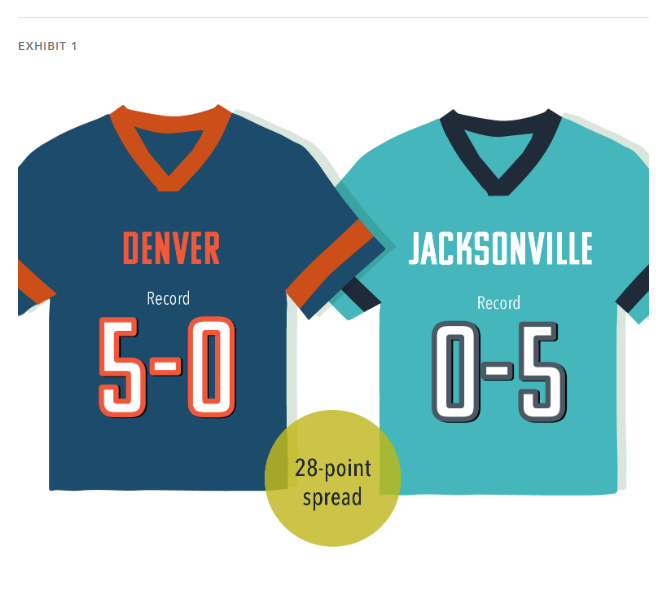An important function of competitive markets is driving prices to equilibrium. This refers to a state where market prices balance the demand from both buyers and sellers. Every trader who thinks the price of a security is high is offset by one who thinks the price is low. So, they agree to transact, voluntarily, at the current price. If there is insufficient interest in buying, the price must fall until a new equilibrium is reached.
If this sounds too abstract, sports betting markets may be a useful parallel. When an undefeated team squares off against a winless team, few expect the latter to emerge victorious. The only way to induce gamblers to bet on the weaker squad is to lower the “price.” This is accomplished by a point spread indicating essentially how much the underdog can lose by and still be considered a winner for betting purposes.
The largest point spread in NFL history came in 2013 when the Denver Broncos played the Jacksonville Jaguars. The gulf in quality between the teams was so great that nobody would bet on the moribund Jaguars until you spotted them 28 free points. Anything short of that and the supply would exceed the demand for the Jaguars.
In case you’re wondering, the Broncos won that 2013 contest by “only” 16 points. So, the winning bet was the Jaguars. An underdog winning against the spread is far from an aberration—historically, they do about half the time.1 And that’s the key takeaway from market equilibrium. Winning against the market becomes a coin flip because the quality of assets has already been handicapped in the prices. In other words, knowing a good company from a bad one won’t help you pick better stocks than the market. You’ve got to have more insight into those companies than other investors, and that’s a tall order in competitive markets.

1. Steven D. Levitt, “Why Are Gambling Markets Organised So Differently from Financial Markets?” The Economic Journal, 114, (April 2004): 223–46.
The original version of this article has been reprinted with permission and was written by Wes Crill, PhD Senior Investment Director and Vice President of Dimensional Funds Advisors.
This content is developed from sources believed to be providing accurate information and provided by Dimensional Fund Advisors. Please consult legal, finance or tax professionals for specific information regarding your individual situation. The opinions expressed and material provided are for general information and should not be considered a solicitation for the purchase or sale of any security.


